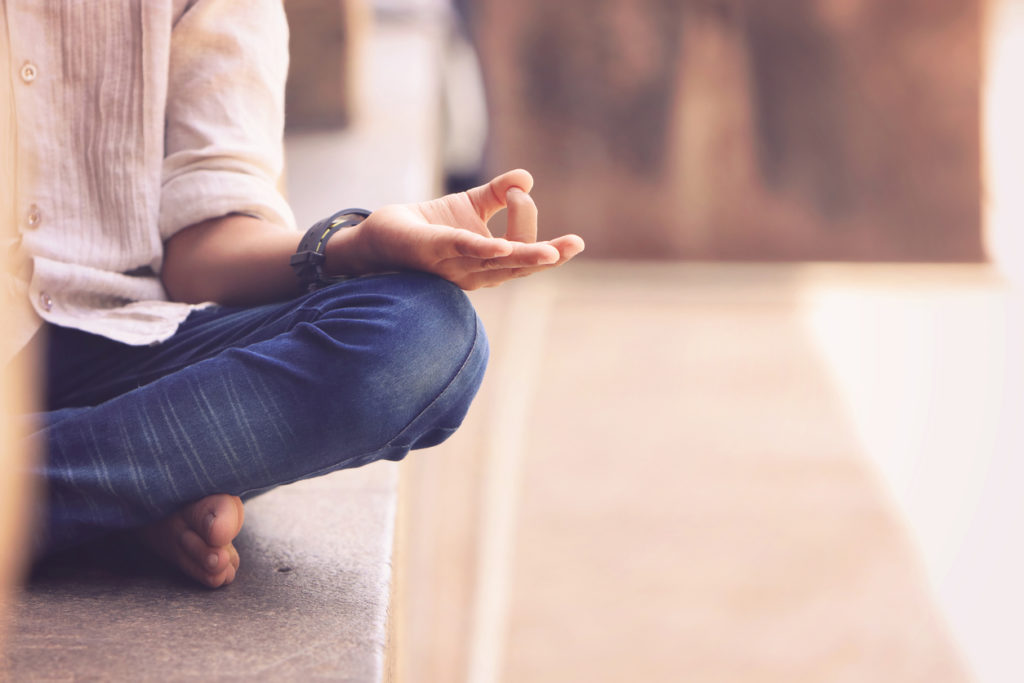
In mid-March, Cindy Ripoll-Martinez, a second-year student at the University of Miami, was alerted that campus would be closing for the remainder of the semester in response to the COVID-19 pandemic. Hastily, she moved 20 minutes away to her brother’s apartment, where she now lives by herself and attends classes virtually.
While Cindy talks regularly to her family in the Dominican Republic, she admits that being alone in the middle of a pandemic can be stressful. As part of her morning routine, she practices mindful sitting, followed by loving-kindness meditation.
Cindy began pursuing contemplative practice in earnest as part of a class she’s enrolled in, “Mindfulness, Attention, and the Brain,” taught by Amishi Jha, a cognitive neuroscientist and Associate Professor of Psychology at the University. A Mind & Life Institute Fellow, Amishi started teaching the course 15 years ago when little was known about the science of mindfulness.
“The fact that today I can point to a whole body of knowledge directly tied to contemplative neuroscience is in large part thanks to Mind & Life’s foundational support of this field,” she says, adding that researchers in her lab have gone on to attend Mind & Life’s Summer Research Institute and have received Francisco J. Varela Research Grants.
Students like Cindy in Amishi’s current class report that they’re now using the mindfulness practices they learned to cope with life in the COVID-19 world. “A lot of it has to do with mind wandering,” says Amishi. “They [the students] don’t know when they’ll be coming back to campus. They don’t know about their internships. They hope their parents won’t lose their jobs. They hope grandma is okay.”
They [the students] don’t know when they’ll be coming back to campus.
They don’t know about their internships. They hope their parents won’t lose their jobs. They hope grandma is okay.
“It’s helped me manage my life better,” says Cindy of her daily mindfulness practice. “It’s made me aware of my thoughts throughout the day, especially distracting thoughts when I try to do homework or pay attention to family members when they’re talking.”
Mindfulness also helps when fears arise. “Before I go to bed, I think to myself, someone could come in,” she says, referring to the prospect of an outside intruder. “Before the training, my brain would have loved those thoughts. Now, I realize it’s no benefit to me to think about all the possible things that could happen. It’s helped me focus on the present moment.”
In class, Amishi’s students learn about the effects of mindfulness and attention training on the brain. “We know attention is important and we’re exploring how mindfulness can improve that,” says Amishi. Students read peer reviewed journal articles and develop their own research questions. Their final paper is a grant proposal which describes how they will test out their research ideas.
Given students’ packed schedules, the course focuses on short-form, 15-minute mindfulness exercises. Every week, the class learns a new mindfulness practice, among them mindful breathing, body scan meditation, and loving-kindness meditation.
“Throughout the semester, we look at topics like the brain bases of mind wandering—which is when our attention strays from its intended object—and how mind wandering can decrease productivity and increase negative mood,” Amishi explains. Students learn to notice their own mind wandering by doing the meditation exercises. “It’s interesting to watch them shift their relationship to it,” she says, adding that students report not being as identified with the contents of their mind wandering by the end of the semester as compared to the beginning.
The course reflects Amishi’s research focus on the impact of short-form mindfulness training on individuals working in high stress environments, including first responders and military personnel.
Throughout the semester, we look at topics like the brain bases of mind wandering—which is when our attention strays from its intended object—and how mind wandering can decrease productivity and increase negative mood.
Meghana Chapalamadugu, a neuroscience major, is poised to graduate from UMiami this spring. She took Amishi’s class to learn about the science of mindfulness. She’s now finishing out the semester from her family’s home in Tampa.
“It’s kinda cramped,” says Meghana of daily life for a family of four working under one roof. While her virtual classes are manageable, she’s having to adjust her expectations around what’s next. “You work so hard for four years. A graduation with family and friends present would have been nice,” she says.
Meghana will begin medical school in the fall but is unclear whether classes will be held in person. “There are hands-on experiences you just can’t get through online media,” she says. “It’s kind of stressful not knowing what’s going to happen with that.”
To help cope with looming uncertainties, Meghana spends 15 minutes a day engaged in an open monitoring practice she learned in Amishi’s class. Sitting on a bench or cross legged on the ground, she focuses on stillness and letting her thoughts come and go without being judgmental or dismissive. If she starts to worry or get into a “ruminative headspace,” she labels what comes to mind as a thought and lets it go.
“I end up feeling better,” says Meghana, adding, “it’s a tool for managing stress and worry.” It’s also improved her relationships with family and friends. “I’ve become more willing to see another person’s perspective rather than being judgmental.”
Amishi sees short-form meditation as particularly useful given the stress people are experiencing as a result of the pandemic. Increased fear has a broader cognitive effect, she explains, and interferes with our ability to stay focused on the task at hand.
Striving to cultivate a positive mindset under such circumstances can be counter-productive, she adds. “You want to be careful with how you expend your cognitive resources. Trying to make yourself feel good is the wrong requirement,” she says. “Instead, notice how you’re feeling. Acknowledge it. Know that the prominence of those feelings will shift over time.”
One of the positives to arise from the pandemic, according to Amishi, is valuing simple pleasures we once took for granted. When asked what they wanted to be doing four months from now, her students responded with ease: to hug a friend, go out for breakfast, spend time at the beach.
As for Cindy, she’s now sharing the practices she learned with family and friends and wants to dig deeper into the research questions she’s generated in class, particularly related to binaural beats and mindfulness meditation. “It [mindfulness] has given me incredible benefits,” she says. “I just want everyone to be doing it.”
In June, Amishi Jha will share more about her research and its impact in a Mind & Life podcast interview.

Amishi Jha, PhD
University of Miami
Convening Faculty, Fellow, Grantee, Planning Committee Member, Research and Programs Council Member

